第18章 CHAPTER III(5)
In the body of the text, besides, my eye caught, as it passed, some deadly expressions: "Figure somewhat fleshy," "bright, intellectual smile," "the unconsciousness of genius," "'Now, Mr. Dodd,' resumed the reporter, 'what would be your idea of a distinctively American quality in sculpture?'" It was true the question had been asked; it was true, alas! that I had answered; and now here was my reply, or some strange hash of it, gibbeted in the cold publicity of type. I thanked God that my French fellow-students were ignorant of English; but when I thought of the British--of Myner (for instance) or the Stennises --I think I could have fallen on Pinkerton and beat him.
To divert my thoughts (if it were possible) from this calamity, I turned to a letter from my father which had arrived by the same post. The envelope contained a strip of newspaper-cutting; and my eye caught again, "Son of Millionaire Dodd--Figure somewhat fleshy," and the rest of the degrading nonsense.
What would my father think of it? I wondered, and opened his manuscript. "My dearest boy," it began, "I send you a cutting which has pleased me very much, from a St. Joseph paper of high standing. At last you seem to be coming fairly to the front; and I cannot but reflect with delight and gratitude how very few youths of your age occupy nearly two columns of press-matter all to themselves. I only wish your dear mother had been here to read it over my shoulder; but we will hope she shares my grateful emotion in a better place. Of course I have sent a copy to your grandfather and uncle in Edinburgh; so you can keep the one I enclose. This Jim Pinkerton seems a valuable acquaintance; he has certainly great talent; and it is a good general rule to keep in with pressmen."
I hope it will be set down to the right side of my account, but I had no sooner read these words, so touchingly silly, than my anger against Pinkerton was swallowed up in gratitude. Of all the circumstances of my career, my birth, perhaps, excepted, not one had given my poor father so profound a pleasure as this article in the _Sunday Herald_. What a fool, then, was I, to be lamenting! when I had at last, and for once, and at the cost of only a few blushes, paid back a fraction of my debt of gratitude.
So that, when I next met Pinkerton, I took things very lightly; my father was pleased, and thought the letter very clever, I told him; for my own part, I had no taste for publicity: thought the public had no concern with the artist, only with his art; and though I owned he had handled it with great consideration, I should take it as a favour if he never did it again.
"There it is," he said despondingly. "I've hurt you. You can't deceive me, Loudon. It's the want of tact, and it's incurable."
He sat down, and leaned his head upon his hand. "I had no advantages when I was young, you see," he added.
"Not in the least, my dear fellow," said I. "Only the next time you wish to do me a service, just speak about my work; leave my wretched person out, and my still more wretched conversation; and above all," I added, with an irrepressible shudder, "don't tell them how I said it! There's that phrase, now: 'With a proud, glad smile.' Who cares whether I smiled or not?"
"Oh, there now, Loudon, you're entirely wrong," he broke in.
"That's what the public likes; that's the merit of the thing, the literary value. It's to call up the scene before them; it's to enable the humblest citizen to enjoy that afternoon the same as I did. Think what it would have been to me when I was tramping around with my tin-types to find a column and a half of real, cultured conversation--an artist, in his studio abroad, talking of his art--and to know how he looked as he did it, and what the room was like, and what he had for breakfast; and to tell myself, eating tinned beans beside a creek, that if all went well, the same sort of thing would, sooner or later, happen to myself: why, Loudon, it would have been like a peephole into heaven!"
"Well, if it gives so much pleasure," I admitted, "the sufferers shouldn't complain. Only give the other fellows a turn."
The end of the matter was to bring myself and the journalist in a more close relation. If I know anything at all of human nature--and the IF is no mere figure of speech, but stands for honest doubt--no series of benefits conferred, or even dangers shared, would have so rapidly confirmed our friendship as this quarrel avoided, this fundamental difference of taste and training accepted and condoned.